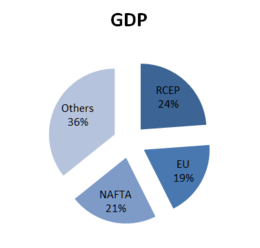
Back NAFTA Afrikaans نافتا Arabic Tratáu de Llibre Comerciu d'América del Norte AST Şimali Amerika Azad Ticarət Assosiasiyası Azerbaijani НАФТА Byelorussian Северноамериканско споразумение за свободна търговия Bulgarian North American Free Trade Agreement Breton Àrea de Lliure Comerç d'Amèrica del Nord Catalan NAFTA Czech North American Free Trade Agreement Danish
North American Free Trade Agreement | |
|---|---|
| 1994–2020 | |
 | |
| Languages | |
| Type | Free trade area |
| Member states | Canada Mexico United States |
| History | |
• Effective | January 1, 1994 |
• USMCA in force | July 1, 2020 |
| Area | |
• Total | 21,578,137 km2 (8,331,365 sq mi) |
• Water (%) | 7.4 |
| Population | |
• 2018 estimate | 490,000,000 |
• Density | 22.3/km2 (57.8/sq mi) |
| GDP (PPP) | 2018 estimate |
• Total | $24.8 trillion[1] |
• Per capita | $50,700 |
Website www | |

The North American Free Trade Agreement (NAFTA /ˈnæftə/ NAF-tə; Spanish: Tratado de Libre Comercio de América del Norte, TLCAN; French: Accord de libre-échange nord-américain, ALÉNA) was an agreement signed by Canada, Mexico, and the United States that created a trilateral trade bloc in North America. The agreement came into force on January 1, 1994, and superseded the 1988 Canada–United States Free Trade Agreement between the United States and Canada. The NAFTA trade bloc formed one of the largest trade blocs in the world by gross domestic product.
The impetus for a North American free trade zone began with U.S. president Ronald Reagan, who made the idea part of his 1980 presidential campaign. After the signing of the Canada–United States Free Trade Agreement in 1988, the administrations of U.S. president George H. W. Bush, Mexican president Carlos Salinas de Gortari, and Canadian prime minister Brian Mulroney agreed to negotiate what became NAFTA. Each submitted the agreement for ratification in their respective capitals in December 1992, but NAFTA faced significant opposition in both the United States and Canada. All three countries ratified NAFTA in 1993 after the addition of two side agreements, the North American Agreement on Labor Cooperation (NAALC) and the North American Agreement on Environmental Cooperation (NAAEC).
Passage of NAFTA resulted in the elimination or reduction of barriers to trade and investment between the United States, Canada, and Mexico. The effects of the agreement regarding issues such as employment, the environment, and economic growth have been the subject of political disputes. Most economic analyses indicated that NAFTA was beneficial to the North American economies and the average citizen,[2][3][4] but harmed a small minority of workers in industries exposed to trade competition.[5][6] Economists held that withdrawing from NAFTA or renegotiating NAFTA in a way that reestablished trade barriers would have adversely affected the U.S. economy and cost jobs.[7][8][9] However, Mexico would have been much more severely affected by job loss and reduction of economic growth in both the short term and long term.[10]
After U.S. President Donald Trump took office in January 2017, he sought to replace NAFTA with a new agreement, beginning negotiations with Canada and Mexico. In September 2018, the United States, Mexico, and Canada reached an agreement to replace NAFTA with the United States–Mexico–Canada Agreement (USMCA), and all three countries had ratified it by March 2020. NAFTA remained in force until USMCA was implemented.[11] In April 2020, Canada and Mexico notified the U.S. that they were ready to implement the agreement.[12] The USMCA took effect on July 1, 2020, replacing NAFTA.
- ^ "Report for Selected Countries and Subjects". Archived from the original on February 14, 2021. Retrieved September 5, 2017.
- ^ "NAFTA's Economic Impact". Council on Foreign Relations. Archived from the original on July 21, 2017. Retrieved July 18, 2017.
- ^ Cite error: The named reference
:9was invoked but never defined (see the help page). - ^ Cite error: The named reference
:0was invoked but never defined (see the help page). - ^ Hiltzik, Michael (January 30, 2017). "NAFTA doesn't count for much economically, but it's still a huge political football. Here's why". Los Angeles Times. ISSN 0458-3035. Archived from the original on August 29, 2017. Retrieved July 18, 2017.
- ^ Rodrik, Dani (June 2017). "Populism and the Economics of Globalization". NBER Working Paper No. 23559. doi:10.3386/w23559.
- ^ Cite error: The named reference
:8was invoked but never defined (see the help page). - ^ Cite error: The named reference
:10was invoked but never defined (see the help page). - ^ Cite error: The named reference
:11was invoked but never defined (see the help page). - ^ "Nafta withdrawal would hit US GDP without helping trade deficit – report". Financial Times. Archived from the original on December 10, 2022.
- ^ "United States-Mexico-Canada Agreement". USTR. Archived from the original on February 17, 2021. Retrieved October 1, 2018.
- ^ CBC News, "Mexico joins Canada, notifies U.S. it's ready to implement new NAFTA" 2020/04/04 Archived 2020-11-26 at the Wayback Machine accessed 06 April 2020
Cite error: There are <ref group=lower-alpha> tags or {{efn}} templates on this page, but the references will not show without a {{reflist|group=lower-alpha}} template or {{notelist}} template (see the help page).
